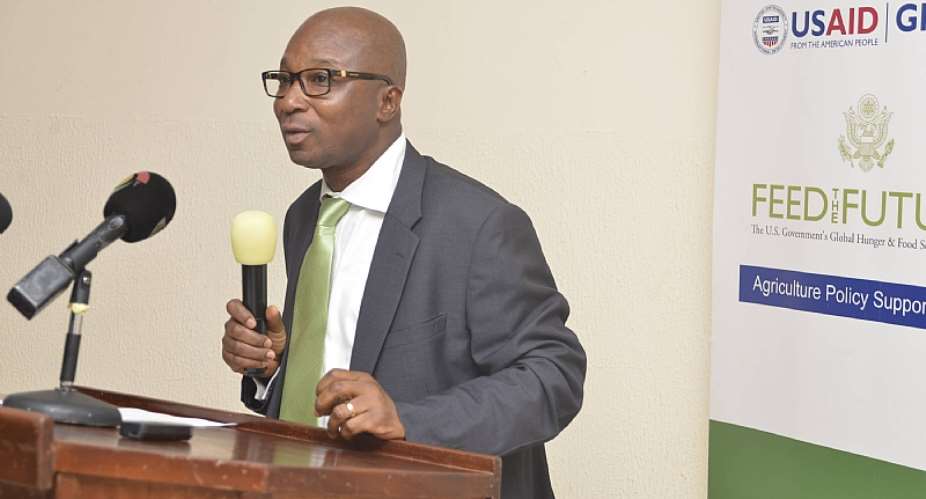Accra, Ghana– Funded by USAID, the Feed the Future Ghana Agriculture Policy Support Project (APSP) in collaboration with the Lands Commission, organized a one-day validation workshop on guidelines for large-scale land transactions. Land transactions above or below 50 acres may trigger social, economic and environmental concerns that need to be safeguarded.
The workshop will give stakeholders in the sector an opportunity to discuss and contribute on policy guidelines for acquiring large plots of lands in Ghana. The draft guidelines are necessary because in recent times, Ghana has experienced an unprecedented wave of acquisitions involving large plots of land, primarily for various agricultural ventures. The guidelines are therefore an intervention which is part of the government’s overall effort to regulate land acquisition in Ghana and improve land security, as well as tenure arrangements for increased private sector investments.
According to an official of the Lands Commission, Dr. Stanislaus Adiaba, “It is even more worrying that these acquisitions have been done by foreign private business entities, sometimes aided by their local counterparts. This new phenomenon needs to be tackled, but with tact, especially because it has several ramifications when considered within the bigger global interest of foreign investments.”
Dr. Adiaba further commented, “These lands are being acquired in rural areas occupied by vulnerable smallholder farmers who have no registered interests in the lands and may lose their livelihoods. Again, customary laws that demand consultations between traditional leadership and land occupiers are sometimes over-looked because of monetary enticements.” Further, he remarked “Some projects for which the lands are acquired may have environmental implications, and I encourage the state to take appropriate measures. Additionally, there have been speculative acquisitions that jeopardize state policy on land use and development.”
“These guidelines therefore seek to introduce safeguards and provide measures in handling such large-scale land transactions in conformity with good governance practices and standard procedures to ensure effective grassroots consultation with persons who would directly be affected by such transactions,” stated Dr. Adiaba.
During the workshop, Mr. Walter Nunez-Rodriguez, the Chief of Party of the APSP remarked, “We deem it appropriate to partner with the Government of Ghana to see this project through because it promotes better land use, private investments in agriculture endeavors and ensures that all acquisitions are made to conform to the land use plan of the areas involved.”
The workshop was attended by representatives of the Medium Term Agriculture Sector Investment Plan (METASIP) Steering Committee, ministries, departments and agencies, civil society organizations, non-governmental organizations, women’s advocacy groups, traditional rulers and private sector investors in agriculture.
About APSP
The Agriculture Policy Support Project (APSP) is a five-year Feed the Future project, with the goal to improve the food security-enabling environment for private sector investment. The aim is to increase the capacity of the Government of Ghana (GoG), the private sector and civil society organizations (CSOs) to implement evidence-based policies, conduct research and advocacy and perform rigorous monitoring and evaluation (M&E) of agriculture programs implemented under the Medium Term Agriculture Sector Investment Plan (METASIP).
About Feed the Future:
Feed the Future is the U.S. Government’s global hunger and food security initiative. With a focus on smallholder farmers, particularly women, Feed the Future supports partner countries in developing their agriculture sectors to spur economic growth and trade that increase incomes and reduce hunger, poverty, and undernutrition. For more information, visit www.feedthefuture.gov.





 We’ll no longer tolerate your empty, unwarranted attacks – TUC blasts Prof Adei
We’ll no longer tolerate your empty, unwarranted attacks – TUC blasts Prof Adei
 Bawumia donates GHc200,000 to support Madina fire victims
Bawumia donates GHc200,000 to support Madina fire victims
 IMF to disburse US$360million third tranche to Ghana without creditors MoU
IMF to disburse US$360million third tranche to Ghana without creditors MoU
 Truck owner share insights into train collision incident
Truck owner share insights into train collision incident
 Paramount chief of Bassare Traditional Area passes on
Paramount chief of Bassare Traditional Area passes on
 Two teachers in court over alleged illegal possession of BECE papers
Two teachers in court over alleged illegal possession of BECE papers
 Sunyani: Victim allegedly shot by traditional warriors appeals for justice
Sunyani: Victim allegedly shot by traditional warriors appeals for justice
 Mahama vows to scrap teacher licensure exams, review Free SHS policy
Mahama vows to scrap teacher licensure exams, review Free SHS policy
 Government will replace burnt Madina shops with a new three-story, 120-store fac...
Government will replace burnt Madina shops with a new three-story, 120-store fac...
